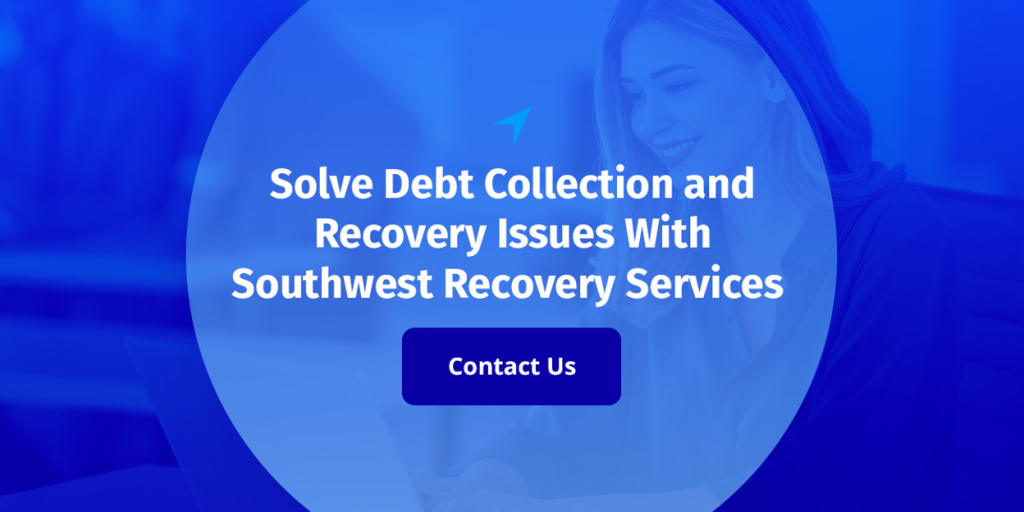- Make A Payment (866) 558-3328
- Client Portal
- Consumer Support

When a client refuses to pay for services or products rendered, the consequences extend far beyond a single unpaid invoice.
Nonpayment disrupts cash flow, strains operations, and forces business owners to divert valuable time away from growth activities. For B2B companies, the challenge is particularly acute because commercial transactions often involve larger amounts and longer payment terms.
Understanding your collection options and knowing when to escalate from internal efforts to professional assistance can mean the difference between recovering what you’re owed and writing off the debt as a loss.
|
Southwest Recovery Services: Get Your Money Back 20+ Years Experience | Texas-Based | Contingency Only – You Pay When We Collect
Built for Commercial Collections:
The Southwest Recovery Difference: ✓ Contingency only – no upfront costs ✓ Veteran collectors with respectful omnichannel outreach ✓ Priority sectors: trucking, logistics, contractors, oil & gas ✓ Clear reporting on account status and outcomes Trust & Results You Need: Nationally recognized ethical collections agency with 12 offices across six states. Compliance-first approach with no threats or guarantees. |
Your first response to a non-paying client should be professional, clear communication. Many payment delays result from administrative oversights, invoice disputes, or temporary cash flow challenges rather than intentional fraud. A polite yet firm payment reminder sent shortly after an invoice becomes overdue signals seriousness without damaging the relationship.
When reaching out, reference specific invoice numbers, amounts, and due dates. Ask directly if there are any issues preventing payment. Sometimes, clients have legitimate concerns about the work performed or billing errors that need resolution.
Documentation is critical throughout the collection process. Maintain detailed records of every communication attempt, including the date, time, method (phone, email, letter), person contacted, and outcome.
Save all emails, note phone conversation details, and keep copies of formal letters sent. This comprehensive record becomes invaluable if you need to escalate to a collection agency or pursue legal action.
Not every client who falls behind on payments is trying to avoid their obligations. Cash flow challenges, unexpected expenses, or temporary business setbacks often prevent otherwise responsible clients from paying on time.

Consider offering installment payment plans that break the outstanding balance into smaller, more manageable amounts paid over an agreed-upon schedule. Some clients may benefit from deferred payment arrangements that provide additional time before payment begins.
The key is structuring an agreement that gets you paid while accommodating the client’s genuine financial constraints.
The convenience of modern payment also matters. Accept credit cards, electronic wallets, ACH transfers, and online payment portals alongside traditional checks. Removing payment friction often removes excuses for continued delay.
When negotiating payment arrangements, always document the agreement in writing. Specify the exact payment amounts, due dates, and consequences for missed payments.
If your internal collection efforts, payment reminders, phone calls, and negotiation attempts fail to produce results after 60 to 90 days, it’s time to consider professional collection assistance.
This is where our service at Southwest Recovery Services becomes an invaluable partner for B2B businesses.
Professional collection agencies work on a contingency fee basis, meaning you pay nothing up front and only pay a percentage of what they successfully recover. This eliminates financial risk; if they don’t collect, you don’t pay.
Contingency rates typically range from 15% to 40% depending on factors like debt age, amount, and complexity.
Veteran collectors understand debtor psychology, employ proven negotiation strategies, and know which communication strategies work best.
They also understand the critical importance of respectful, relationship-preserving communication in the B2B environment where today’s debtor might become tomorrow’s paying customer.
Another advantage professional agencies provide is compliance expertise. Debt collection is heavily regulated by the Fair Debt Collection Practices Act (FDCPA) at the federal level, with many states adding additional requirements.
Professional agencies maintain compliance departments and monitor all communications to ensure adherence to legal requirements—protecting your business from liability.

Legal action is the final escalation in debt collection. Filing a lawsuit in small claims court or civil court can result in a judgment that legally obligates the debtor to pay. However, winning a judgment doesn’t guarantee collection; you still need to enforce it through wage garnishment, bank levies, or property liens.
Legal proceedings are costly, time-consuming, and do not necessarily guarantee a payoff. For these reasons, most businesses should pursue legal action only after professional collection attempts have failed and when the debt amount justifies the expense.
Alternative dispute resolution methods like mediation or arbitration can provide less adversarial paths to resolution. These approaches often cost less than litigation while still producing binding agreements.
Prevention is always more effective than remediation. Some ways to do this include:

When clients refuse to pay despite your best internal efforts, partnering with a professional collection agency that understands B2B dynamics becomes essential.
We at Southwest Recovery Services have spent over two decades specializing in commercial debt recovery, developing expertise specifically suited to B2B collections where relationship preservation matters as much as debt recovery.
Our approach combines the persistence needed to recover what you’re owed with the professionalism required to protect valuable business relationships. Our veteran collectors understand that aggressive tactics might pressure payment, but often permanently damage customer relationships.
Instead, we act as neutral third parties who separate financial disputes from ongoing business operations, using respectful communication and flexible payment solutions to find a resolution.
Our proprietary AI-powered tracking system ensures reliable follow-through on every account. Every interaction across phone, email, SMS, and mail is documented and tracked, with software monitoring payment promises and triggering appropriate follow-ups. Daily founder involvement provides accountability and quality control throughout the collection process.
We specialize in serving businesses across the trucking and logistics, oil and gas, property management, and contracting industries. Our contingency-only pricing model means you face zero upfront costs and zero financial risk. You pay only when we successfully recover your money, perfectly aligning our incentives with yours.
Contact Southwest Recovery Services Now
Most businesses should attempt internal collection for 60 to 90 days after an invoice becomes past due before engaging a professional agency. This timeframe gives your payment reminders and direct calls a reasonable opportunity to succeed.
However, recovery rates decline significantly as debts age, with accounts over 120 days past due becoming substantially harder to collect. Some businesses refer accounts as early as 30 days past due when dealing with clients showing concerning payment patterns.
Not when you partner with a professional agency that understands relationship preservation. Reputable B2B collection agencies like Southwest Recovery Services approach accounts as neutral third parties, separating the financial dispute from ongoing business operations.
Professional collectors use respectful communication and focus on finding payment solutions rather than employing aggressive tactics. Many B2B relationships survive the collection process because skilled collectors offer flexible payment arrangements when appropriate.
Provide a complete file for each account referred to collections.
Essential documentation includes all original contracts or service agreements, itemized invoices showing what’s owed and when payment was due, proof of delivery or service completion, records of all previous collection attempts you’ve made internally, and any correspondence related to disputes or payment discussions.
Organize everything chronologically so the agency can quickly understand the complete account history. Better documentation directly correlates with higher recovery rates.
The answer depends on the specific situation. When clients face legitimate cash flow challenges but demonstrate a willingness to pay, offering structured payment plans often represents the best path to full recovery.
Payment plans keep clients engaged and provide you with regular cash flow. However, for clients clearly avoiding payment or showing patterns of dishonesty, demanding full payment and maintaining firm collection pressure may be more appropriate.
You should consider engaging a professional collection agency after 60 to 90 days of unsuccessful internal collection efforts. This timeframe allows you to exhaust your own payment reminders, phone calls, and negotiation attempts while the debt is still relatively fresh.
Waiting too long can reduce recovery rates, as older debts become increasingly difficult to collect.


We make it fast and easy to refer past due and delinquent accounts to our professional recovery agents. You decide the range on what you will accept on each case, and you ONLY pay a percentage of what we actually collect to resolve the case. Ready to get started, or want to learn more? Fill out this form and a dedicate account manager will call you to get started.